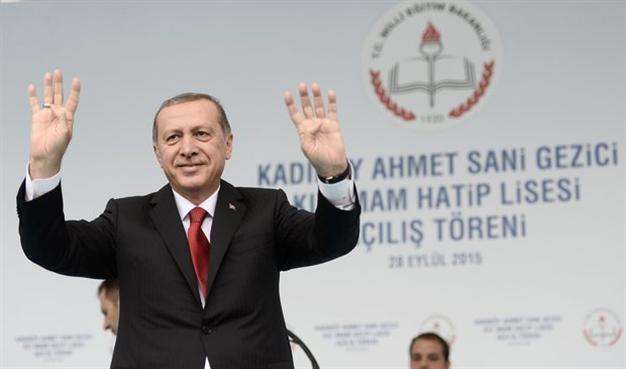Turkey's Erdoğan hails push for İmam Hatip high schools
ISTANBUL

AA photo
Turkish President Recep Tayyip Erdoğan has hailed the progress made in making İmam Hatip religious vocational high schools into more active and visible institutions during his term in power.
“Turkey experienced the freak of eight-year [compulsory] education. They virtually cut our carotid artery. Can a person live when his carotid artery is cut? He cannot. They put a generation in that position. At the time, there were 600,000 İmam Hatip students, but it fell to 60,000 all at once,” Erdoğan said Sept. 28 during the opening of an İmam Hatip high school in Istanbul on the first day of the scholastic year.
The president, however, noted with pride that the number of students at İmam Hatip schools has now reached 1,600,000.
In 2012, the Justice and Development Party (AKP) implemented a new education system, known as “4+4+4,” which extended mandatory schooling to 12 years divided into three levels. The law also reinstated the secondary stage of the İmam Hatip religious schools, although the move attracted a harsh reaction for opening the door to conservative parents to remove their daughters from high school in favor of home study at an early age.
“They virtually paralyzed the entire education system just to end İmam Hatip schools,” Erdoğan said.
“They said, ‘Turkey doesn’t need that many imams,’ and ‘Turkey doesn’t need that many muezzins.’ The goals of these schools is not just to raise imams and muezzins,” he said. “We didn’t go there to become ‘washers of the dead,’ but there is actually a need for ‘washers of the dead’ in this country, too,” said Erdoğan, himself a graduate of an İmam Hatip high school, while arguing that all Muslims should have knowledge of the Muslim custom of bathing the dead, regardless of whether they are imams or muezzins.
Erdoğan also hailed the AKP’s efforts at ending restrictions on headscarves in public schools. “By ending [the ban] on wearing headscarves at secondary schools and high schools, we have lifted the pressure on our daughters,” he said, citing “patience” as key to such progresses that especially appealed to pious people.
In fall 2013, the AKP lifted a decades-old ban on women wearing the headscarf in state institutions as part of a package of reforms the government said were meant to improve democracy. Shortly after the move, four female AKP lawmakers wearing headscarves entered parliament in a historic move for Turkey.
